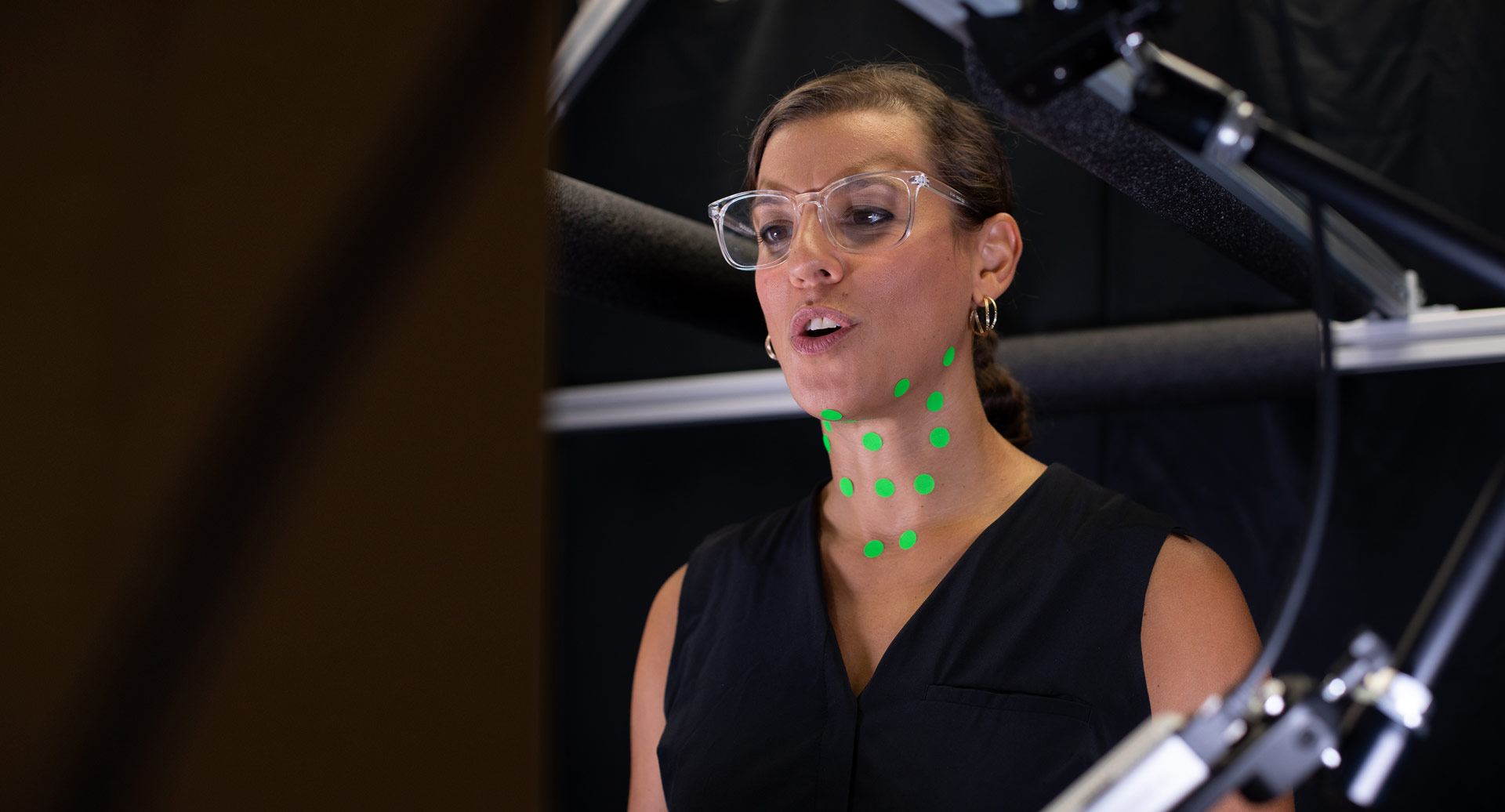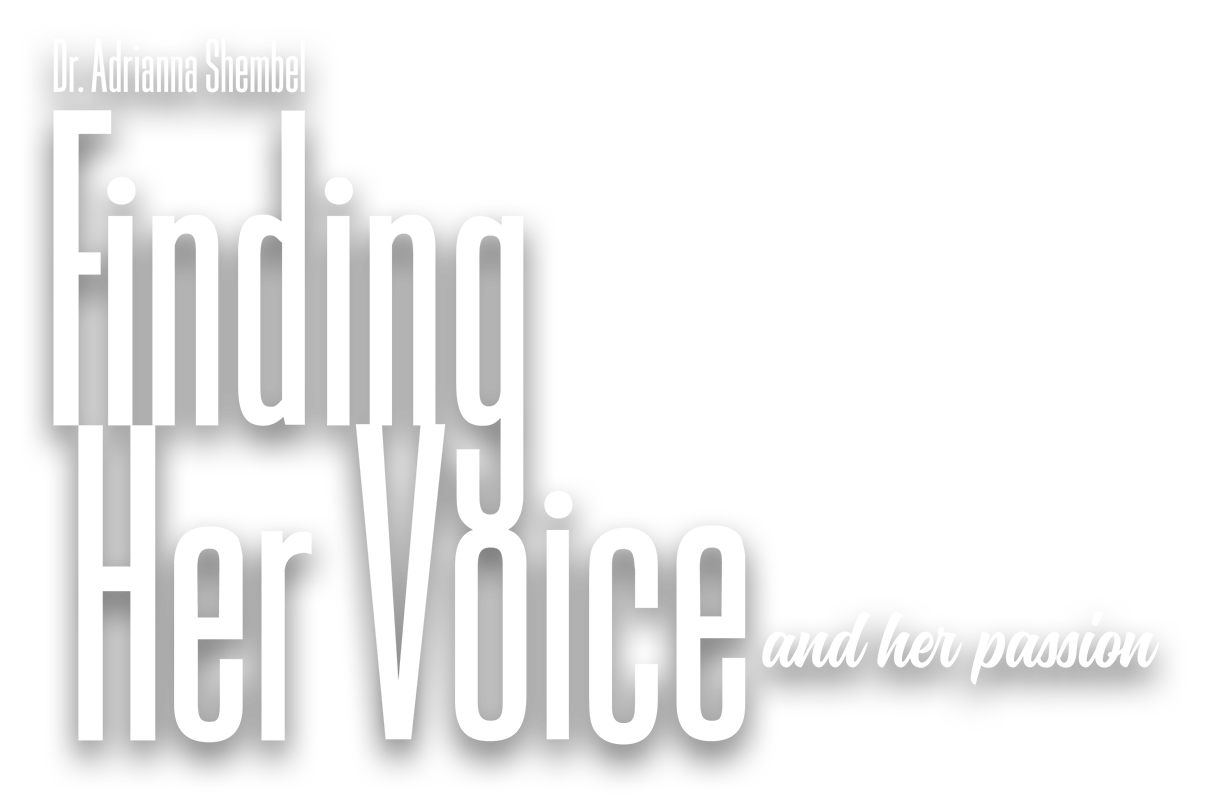
Dr. Adrianna Shembel has been singing her entire life.
The assistant professor of speech, language, and hearing in the School of Behavioral and Brain Sciences at The University of Texas at Dallas immersed herself in the world of musical theater in high school. She continued focusing on vocal performance as she began college.
In those days, Shembel thought of singing as her identity, as did her circle of friends, many of whom were attending performing arts conservatories.
When they would return home from college, Shembel noticed a trend.
“Quite a number of my friends were developing, what we call colloquially, ‘singer’s nodes.’”
Shembel, now a licensed speech-language pathologist, said her friends were developing the nodules because of their high vocal demands. They had to see physicians to treat their throats and speech-language pathologists to rehabilitate their voices.
“At the same time, I really loved science,” said Shembel, who went on to minor in theater, dance and music. “As a kid, I did all the science fairs and was a total nerd for science, but I was also a total nerd for vocal performance, music and theater arts. I was trying to figure out which road to go down.
“This was the moment I realized, ‘Oh, I don’t have to choose. I can do both. I can do the research and the biology, and continue to have one foot in the musical and performing arts world.’”
A Research and Clinical Duet
In 2020 Shembel joined the faculty at UT Dallas, where she studies the effects of increased neuromuscular demands on the vocal subsystems and sensorimotor voice disorders. A joint appointment as an assistant professor of otolaryngology — head and neck surgery at UT Southwestern Medical Center allows her to share her UTD research to improve comprehensive care for patients with voice disorders.
While Shembel does not currently see patients clinically, she often collaborates with clinicians in the UT Southwestern Voice Center, where occupational voice users, or professionals who rely on their voices – singers, actors, public speakers, broadcasters, lawyers, clergy and teachers, and anyone else experiencing vocal problems – are treated.
“The majority of specialty voice centers are only clinically focused,” she said. “What’s special about this joint appointment is that we are developing a research program to inform what’s happening clinically and vice versa. The research we do is very translational and relevant to the populations and patients that are seen in the clinic.”
Exercising Her Expertise
After completing bachelor’s and master’s degrees in communication sciences and disorders, Shembel worked as a speech-language pathologist before earning her PhD from the University of Pittsburgh.
Her dissertation focused on a laryngeal breathing disorder called exercise-induced paradoxical vocal fold motion disorder. It typically affects younger individuals, most commonly teenage athletes.
“In fact, they’re really high-caliber, high-capacity athletes,” Shembel said. “Many of them are going to or attempting to go to college on athletic scholarships and are strong in their sports.
“Then, all of a sudden, they can’t breathe.”
In patients with this disorder, the larynx becomes discoordinated from the respiratory system and needs recalibration. Clinicians help athletes breathe from their throats a certain way and coordinate their diaphragm and abdominal muscles.
“It really impacts these people because this is their identity,” Shembel said. “All of their friends are athletes. And this thing takes everything away from them. It’s more than just a breathing disorder.”
Fine-Tuning the Research
Shembel, who also teaches graduate courses at UTD, is exploring how the larynx changes and is affected by high vocal demands. Two current studies involve occupational voice users who cannot use their voices.
“Their voice is their instrument, and they need it to make money,” she said. “If we understand the precursors to the development of these disorders, we can use that information to prevent their development in the first place.”
An early-stage research project in which she is also involved is looking at muscle differences in patients with vocal fold paralysis. Current therapies help patients compensate but do not treat the underlying issue.
Shembel is collaborating with UTD’s Texas Biomedical Device Center and UT Southwestern to see if vagus nerve stimulation, paired with laryngeal motor tasks, will improve function. The vagus nerve connects the brain with the parasympathetic nervous system, and, when paired with rehabilitation therapy, has been shown to strengthen neural connections in certain disorders.
For Shembel, the ultimate goal is to identify better methods to diagnose, manage and treat voice disorders through her research and training of future clinicians.
She continues to be inspired by those whose livelihoods depend on their voices, and she remembers her high school friends who viewed their voices as their identities.
“Wanting to solve these research questions goes back to living in that vocal performance world, and also back to patients in the clinic who are sitting in the exam chair asking me, ‘Can I perform again, or do I need to find another career?’ It’s very impactful,” she said.
And in her own spare time? Shembel can be found belting out tunes at local karaoke venues.
– Brittany Magelssen
“I realized, ‘Oh, I don’t have to choose. I can do both. I can do the research and the biology, and continue to have one foot in the musical and performing arts world.’”
Dr. Adrianna Shembel



